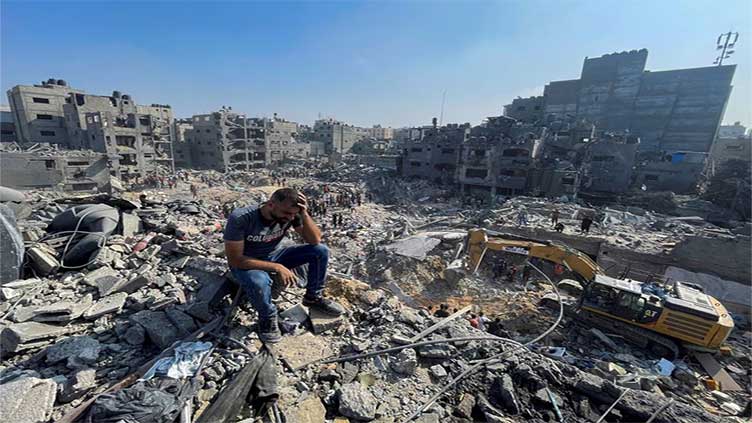UN experts say ceasefire needed as Palestinians at 'grave risk of genocide'

World
A group of independent United Nations experts called on Thursday for humanitarian ceasefire in Gaza.
GENEVA (Reuters) - A group of independent United Nations experts called on Thursday for a humanitarian ceasefire in Gaza, saying time was running out for Palestinians there who are at "grave risk of genocide".
Nearly four weeks of Israeli bombardment on the Gaza Strip in retaliation for deadly attacks by Hamas gunmen in southern Israel on Oct. 7 have killed more than 9,000 people, most of them women and children, health authorities in the Hamas-run enclave say.
Israel says it is targeting Hamas, not civilians, and accuses the Iran-backed militant group of using residents as human shields.
"We remain convinced that the Palestinian people are at grave risk of genocide," the group of experts, made up of seven U.N. special rapporteurs, said in a statement.
"We demand a humanitarian ceasefire to ensure that aid reaches those who need it the most."
The Israeli mission to the U.N. in Geneva called the comments "deplorable and deeply concerning" and blamed Hamas for civilian deaths.
"The current war was brought upon Israel by Hamas terrorists who committed a massacre on October 7, butchering 1,400 people and kidnapping 243 children, men and women," the mission said, referring to the attacks which were the deadliest in Israel's 75-year-history.
The International Criminal Court defines the crime of genocide as the specific intent to destroy in whole, or in part, a national, ethnic, racial or religious group by killing its members or by other means, including imposing measures intended to prevent births or forcibly transferring children from one group to another.
Asked about the independent experts' statement at a press briefing, Stéphane Dujarric, spokesperson for U.N. Secretary-General Antonio Guterres, said a determination of genocide could only be made by a relevant U.N. judicial body.
On Oct. 28, departing senior U.N. human rights official Craig Mokhiber wrote to the High Commissioner for Human Rights Volker Turk, saying: "we are seeing a genocide unfolding before our eyes, and the Organization that we serve appears powerless to stop it."
The U.N. rights office said that Mokhiber's planned retirement took effect this week and that his views were "personal" and did not reflect those of the office.
Speaking to Reuters after the experts' statement was issued, one of its signatories said the people of Gaza had been deprived of the "the most basic elements for living".
"We are using the term risk of genocide because the process that is (underway) is absolutely indiscriminate, affecting, in this case, more than 2 million people," said Pedro Arrojo Agudo, Special Rapporteur on the human rights to safe drinking water and sanitation.
"And in this sense, I think we are facing a risk of genocide, effectively."
Aid supplies to Gaza have been choked since Israel began bombarding the densely populated enclave, with aid organisations saying it is nowhere near matching the needs of its residents.
"The situation in Gaza has reached a catastrophic tipping point," the U.N. experts said, adding that Gazans had been left with scarce water, medicine, fuel and essential supplies while facing health hazards.
The experts also pointed to Israel allies, which they said "bear responsibility and must act now to prevent its disastrous course of action".
"We call on Israel and its allies to agree to an immediate ceasefire," the U.N. experts said. "We are running out of time."


